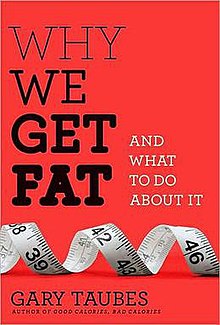Dieting is the practice of eating food in a regulated way to decrease, maintain, or increase body weight, or to prevent and treat diseases such as diabetes and obesity. As weight loss depends on calorie intake, different kinds of calorie-reduced diets, such as those emphasising particular macronutrients, have been shown to be no more effective than one another. As weight regain is common, diet success is best predicted by long-term adherence. Regardless, the outcome of a diet can vary widely depending on the individual.

The Atkins diet is a low-carbohydrate fad diet devised by Robert Atkins in the 1970s, marketed with claims that carbohydrate restriction is crucial to weight loss and that the diet offered "a high calorie way to stay thin forever".

A fad diet is a diet that is popular, generally only for a short time, similar to fads in fashion, without being a standard scientific dietary recommendation, and often making unreasonable claims for fast weight loss or health improvements; as such it is often considered a type of pseudoscientific diet. Fad diets are usually not supported by clinical research and their health recommendations are not peer-reviewed, thus they often make unsubstantiated statements about health and disease.

Low-carbohydrate diets restrict carbohydrate consumption relative to the average diet. Foods high in carbohydrates are limited, and replaced with foods containing a higher percentage of fat and protein, as well as low carbohydrate foods.

William Banting was a notable English undertaker. Formerly obese, he is also known for being the first to popularise a weight loss diet based on limiting the intake of carbohydrates, especially those of a starchy or sugary nature. He undertook his dietary changes at the suggestion of Soho Square physician William Harvey, who in turn had learned of this type of diet, but in the context of diabetes management, from attending lectures in Paris by Claude Bernard.

Weight gain is an increase in body weight. This can involve an increase in muscle mass, fat deposits, excess fluids such as water or other factors. Weight gain can be a symptom of a serious medical condition.

David S. Ludwig is an American endocrinologist and low-carbohydrate diet advocate in Boston, Massachusetts. He is a promoter of functional medicine.
The Montignac diet is a high-protein low-carbohydrate fad diet that was popular in the 1990s, mainly in Europe. It was invented by Frenchman Michel Montignac (1944–2010), an international executive for the pharmaceutical industry, who, like his father, was overweight in his youth. His method is aimed at people wishing to lose weight efficiently and lastingly, reduce risks of heart failure, and prevent diabetes.

A very-low-calorie diet (VLCD), also known as semistarvation diet and crash diet, is a type of diet with very or extremely low daily food energy consumption. VLCDs are defined as a diet of 800 kilocalories (3,300 kJ) per day or less. Modern medically supervised VLCDs use total meal replacements, with regulated formulations in Europe and Canada which contain the recommended daily requirements for vitamins, minerals, trace elements, fatty acids, protein and electrolyte balance. Carbohydrates may be entirely absent, or substituted for a portion of the protein; this choice has important metabolic effects. Medically supervised VLCDs have specific therapeutic applications for rapid weight loss, such as in morbid obesity or before a bariatric surgery, using formulated, nutritionally complete liquid meals containing 800 kilocalories or less per day for a maximum of 12 weeks.

Gary Taubes is an American journalist, writer, and low-carbohydrate / high-fat (LCHF) diet advocate. His central claim is that carbohydrates, especially sugar and high-fructose corn syrup, overstimulate the secretion of insulin, causing the body to store fat in fat cells and the liver, and that it is primarily a high level of dietary carbohydrate consumption that accounts for obesity and other metabolic syndrome conditions. He is the author of Nobel Dreams (1987); Bad Science: The Short Life and Weird Times of Cold Fusion (1993); Good Calories, Bad Calories (2007), titled The Diet Delusion (2008) in the UK and Australia; Why We Get Fat: And What to Do About It (2010); The Case Against Sugar (2016); and The Case for Keto: Rethinking Weight Control and the Science and Practice of Low-Carb/High-Fat Eating (2020). Taubes's work often goes against accepted scientific, governmental, and popular tenets such as that obesity is caused by eating too much and exercising too little and that excessive consumption of fat, especially saturated fat in animal products, leads to cardiovascular disease.
A protein-sparing modified fast or PSMF diet is a type of a very-low-calorie diet with a high proportion of protein calories and simultaneous restriction of carbohydrate and fat. It includes a protein component, fluids, and vitamin and mineral supplementation.
The South Beach Diet is a popular fad diet developed by Arthur Agatston and promoted in his bestselling 2003 book. It emphasizes eating food with a low glycemic index, and categorizes carbohydrates and fats as "good" or "bad". Like other fad diets, it may have elements which are generally recognized as sensible, but it promises benefits not backed by supporting evidence or sound science.
Ronald M. Krauss is an American professor of pediatrics, medical researcher and low-carbohydrate diet advocate. He studies genetic, dietary, and hormonal effects on plasma lipoproteins and coronary disease risk.

Weight management refers to behaviors, techniques, and physiological processes that contribute to a person's ability to attain and maintain a healthy weight. Most weight management techniques encompass long-term lifestyle strategies that promote healthy eating and daily physical activity. Moreover, weight management involves developing meaningful ways to track weight over time and to identify the ideal body weights for different individuals.

Good Calories, Bad Calories: Fats, Carbs, and the Controversial Science of Diet and Health is a 2007 book by science journalist Gary Taubes. Taubes argues that the last few decades of dietary advice promoting low-fat diets has been consistently incorrect. Taubes contends that carbohydrates, specifically refined carbohydrates like white flour, sugar, and starches, contribute to obesity, diabetes, heart disease, and other ailments. Taubes posits a causal link between carbohydrates and cancer, as well.
"A calorie is a calorie" is a tautology used to convey the thermodynamic concept that a "calorie" is a sufficient way to describe the energy content of food.

Mark Adam Hyman is an American physician and author. He is the founder and medical director of The UltraWellness Center. Hyman was a regular contributor to the Katie Couric Show until the show's cancellation in 2013. He writes a blog called The Doctor’s Farmacy, which examines many topics related to human health and welfare, and also offers a podcast by the same name. He is the author of several books on nutrition and longevity, including Food Fix, Eat Fat, Get Thin, and Young Forever.

Pure, White and Deadly is a 1972 book by John Yudkin, a British nutritionist and former Chair of Nutrition at Queen Elizabeth College, London. Published in New York, it was the first publication by a scientist to anticipate the adverse health effects, especially in relation to obesity and heart disease, of the public's increased sugar consumption. At the time of publication, Yudkin sat on the advisory panel of the British Department of Health's Committee on the Medical Aspects of Food and Nutrition Policy (COMA). He stated his intention in writing the book in the last paragraph of the first chapter: "I hope that when you have read this book I shall have convinced you that sugar is really dangerous."
The Rosedale diet is a low-carbohydrate fad diet based on the ideas of Ron Rosedale about how leptin affects the human body. The diet is marketed with questionable claims about how it can treat a large number of human health conditions.
The carbohydrate-insulin model (CIM) posits that obesity is caused by excess consumption of carbohydrate, which then disrupts normal insulin metabolism leading to weight gain and weight-related illnesses. It is contrasted with the mainstream energy balance model (EBM), which holds that obesity is caused by an excess in calorie consumption compared to calorie expenditure. According to the carbohydrate–insulin model, low-carbohydrate diets would be the most effective in causing long-term weight loss. Notable proponents of the carbohydrate–insulin model include Gary Taubes and David Ludwig. The CIM has been tested in mice and humans. Although some experts consider that these studies falsified the CIM, proponents disagree. Available evidence does not support the existence of a long-term advantage in weight loss for low-carbohydrate diets.












